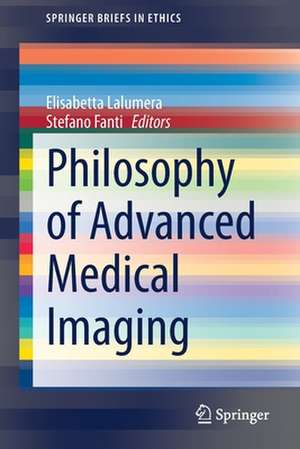Philosophy of Advanced Medical Imaging: SpringerBriefs in Ethics
Editat de Elisabetta Lalumera, Stefano Fantien Limba Engleză Paperback – 16 mar 2021
Din seria SpringerBriefs in Ethics
-
 Preț: 84.28 lei
Preț: 84.28 lei -
 Preț: 377.18 lei
Preț: 377.18 lei -
 Preț: 343.13 lei
Preț: 343.13 lei -
 Preț: 353.67 lei
Preț: 353.67 lei -
 Preț: 377.18 lei
Preț: 377.18 lei -
 Preț: 408.44 lei
Preț: 408.44 lei -
 Preț: 474.84 lei
Preț: 474.84 lei -
 Preț: 343.21 lei
Preț: 343.21 lei -
 Preț: 378.71 lei
Preț: 378.71 lei -
 Preț: 410.77 lei
Preț: 410.77 lei -
 Preț: 377.95 lei
Preț: 377.95 lei -
 Preț: 378.34 lei
Preț: 378.34 lei - 15%
 Preț: 461.87 lei
Preț: 461.87 lei -
 Preț: 414.72 lei
Preț: 414.72 lei -
 Preț: 478.53 lei
Preț: 478.53 lei - 15%
 Preț: 461.73 lei
Preț: 461.73 lei -
 Preț: 377.95 lei
Preț: 377.95 lei -
 Preț: 376.80 lei
Preț: 376.80 lei -
 Preț: 377.95 lei
Preț: 377.95 lei -
 Preț: 477.34 lei
Preț: 477.34 lei -
 Preț: 350.81 lei
Preț: 350.81 lei -
 Preț: 377.95 lei
Preț: 377.95 lei -
 Preț: 174.24 lei
Preț: 174.24 lei -
 Preț: 477.17 lei
Preț: 477.17 lei -
 Preț: 476.57 lei
Preț: 476.57 lei -
 Preț: 476.79 lei
Preț: 476.79 lei -
 Preț: 174.83 lei
Preț: 174.83 lei -
 Preț: 259.41 lei
Preț: 259.41 lei -
 Preț: 259.57 lei
Preț: 259.57 lei -
 Preț: 408.44 lei
Preț: 408.44 lei -
 Preț: 259.19 lei
Preț: 259.19 lei -
 Preț: 410.55 lei
Preț: 410.55 lei - 15%
 Preț: 463.03 lei
Preț: 463.03 lei -
 Preț: 411.16 lei
Preț: 411.16 lei - 15%
 Preț: 463.03 lei
Preț: 463.03 lei -
 Preț: 475.06 lei
Preț: 475.06 lei -
 Preț: 374.08 lei
Preț: 374.08 lei -
 Preț: 408.82 lei
Preț: 408.82 lei -
 Preț: 375.45 lei
Preț: 375.45 lei
Preț: 478.71 lei
Nou
Puncte Express: 718
Preț estimativ în valută:
91.60€ • 95.64$ • 75.81£
91.60€ • 95.64$ • 75.81£
Carte tipărită la comandă
Livrare economică 05-19 aprilie
Preluare comenzi: 021 569.72.76
Specificații
ISBN-13: 9783030614140
ISBN-10: 303061414X
Pagini: 129
Ilustrații: VIII, 129 p. 5 illus., 4 illus. in color.
Dimensiuni: 155 x 235 mm
Greutate: 0.2 kg
Ediția:1st ed. 2020
Editura: Springer International Publishing
Colecția Springer
Seria SpringerBriefs in Ethics
Locul publicării:Cham, Switzerland
ISBN-10: 303061414X
Pagini: 129
Ilustrații: VIII, 129 p. 5 illus., 4 illus. in color.
Dimensiuni: 155 x 235 mm
Greutate: 0.2 kg
Ediția:1st ed. 2020
Editura: Springer International Publishing
Colecția Springer
Seria SpringerBriefs in Ethics
Locul publicării:Cham, Switzerland
Cuprins
Introduction.- Part 1. Epistemology.- Chapter 1. RCTs and the validation of imaging tests: open problems.- Chapter 2. The role of consensus conferences in medical imaging.- Chapter 3. Uncertainty and epistemic risk in diagnosis.- Chapter 4. What is to be an expert in reading images? Artificial intelligence and human expertise.- Chapter 5. Imaging as investigation of mechanisms: the case of psychiatry.- Chapter 6. Big data in medical imaging: a new paradigm?.- Part 2. Ethics.- Chapter 7. Overdiagnosis and incidentalomas: how to define them and how to deal with them.- Chapter 8. Overutilization of imaging tests and healthcare fairness.- Chapter 9. The need of ethical guidelines for the communication with patients.- Chapter 10. Ethical issues in queue-jumping.
Notă biografică
Elisabetta Lalumera (PhD) teaches Philosophy of Science at the University of Milano-Bicocca. She works on philosophical aspects of medicine, clinical psychology, and healthcare. She has published in The Journal of Medicine and Philosophy, Behavioral and Brain Sciences, Dialectica, and other philosophical journals.Stefano Fanti is full time employed in Nuclear Medicine as Professor of Diagnostic Imaging as well as Director of Nuclear Medicine Division at the S.Orsola Policlinic Hospital. Author of more than 1000 papers, including > 400 full articles published in peer reviewed international journals, several books (mainly for Springer) and chapters; invited lecturer at more than 120 national and international meetings.
Textul de pe ultima copertă
This is the first book to explore the epistemology and ethics of advanced imaging tests, in order to improve the critical understanding of the nature of knowledge they provide and the practical consequences of their utilization in healthcare. Advanced medical imaging tests, such as PET and MRI, have gained center stage in medical research and in patients’ care. They also increasingly raise questions that pertain to philosophy: What is required to be an expert in reading images? How are standards for interpretation to be fixed? Is there a problem of overutilization of such tests? How should uncertainty be communicated to patients? How to cope with incidental findings? This book is of interest and importance to scholars of philosophy of medicine at all levels, from undergraduates to researchers, to medical researchers and practitioners (radiologists and nuclear physicians) interested in a critical appraisal of the methodology of their discipline and in the ethical principles and consequences of their work.
Caracteristici
First book to explore the philosophical aspects of advanced diagnostic imaging Addresses the expanding scope and unprecedented impact of advanced medical imaging tests Explores a new interdisciplinary field between applied philosophy and medicine
